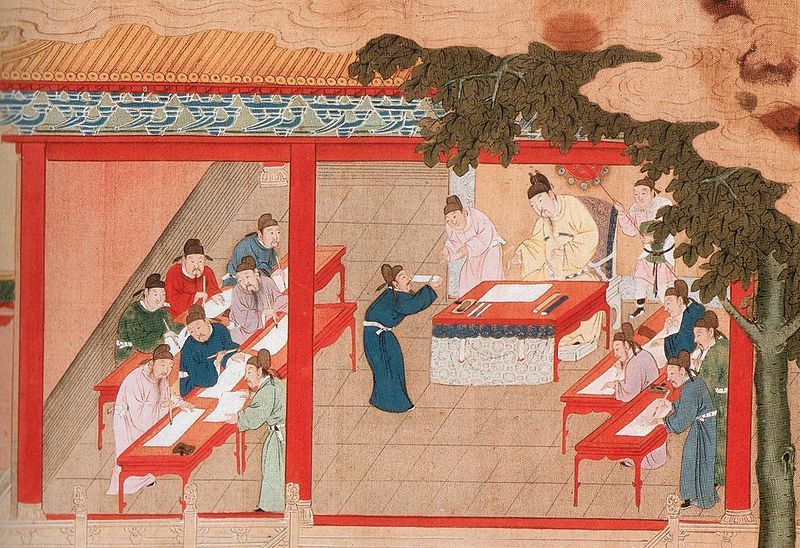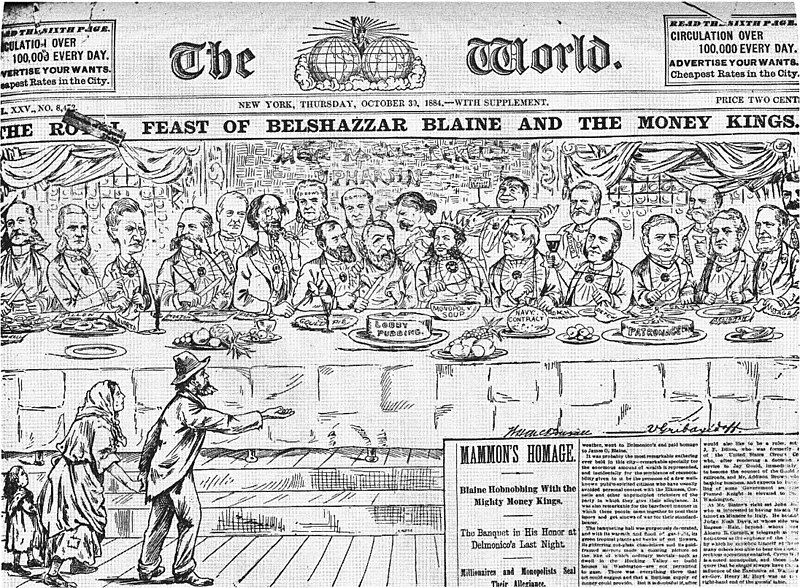understanding of elitism
Posted by Bruce Yu
background of the problem
After the millennium, the ideas of national capitalism and state capitalism around the world gradually replaced the neoliberal ideas that prevailed during the Cold War. Especially when China's reform and opening up gradually got on the right track, the original free market for foreign trade, that is, the cheap productivity market for China to attract foreign capital, was gradually monopolized. The Chinese government gradually began to nationalize the market, enterprises, and spread nationalism. Most of China's private enterprises are controlled by official institutions and large foreign capitals. In this way, China's capital market has been monopolized by bureaucrats and foreign capital after the millennium. Globally, this behavior is not unique. The global public opinion is gradually tilted towards the so-called "national interests". This is not a failure of neoliberalism, on the contrary, the internationalization of capital began to flourish after the millennium. The rise of this so-called "nationalism" actually means that the global market has been opened, and the historic goal of neoliberalism - the opening of the global market - has been accomplished. The original intention of this article is to understand an idea emerging in the global capitalization and neoliberal currents - elitism - in itself and the problems it brings.
The two premises of elitism
Elitism believes that elites, the so-called high-IQ talents, are superior to others and make greater contributions to social construction. This idea has two tacit premises, respectively.
One is the superiority of the elite over other people, that is, over the proletariat. There are two preconditions here. (a) The elites believe that the elite does not belong to the proletariat, but to the petty bourgeoisie (individual entrepreneurs) , the middle class (high-tech talents), and even the bourgeoisie (company management). This classification is not absolute. For example, in some high-welfare societies, knowledge service industries such as doctors, teachers, and lawyers are also considered elites. In today's Chinese society, especially in high-consumption areas such as big cities, although these three do not have the economic treatment of the traditional elite, they still live a life similar to that of the elite, which is the so-called petty bourgeoisie. And China's long bureaucratic system and imperial examination system make the personnel of the state bureaucracy and institutions of higher learning also considered as elites; (b) the proletariat cannot, or it is difficult, to become a part of the elites. If the proletarians can, with a certain amount of resources and effort—even just a single piece of law—become the “social elite” sitting at the desk, the elite class loses its aura of sanctity. Chinese elitists often use so-called IQs, talents, and even patterns to try to explain that proletarians cannot be elites—a ridiculous claim. This premise can be widely accepted by the Chinese community today, and it also has the influence of the bureaucratic imperial examination system.

Second, the value created by the elite is greater than the value created by others. Note that the definition of the elite here has changed significantly, and the definition is very unclear. In the above, that is, the first premise, the elite does not include the traditional big bourgeoisie, that is, the company owner, the company board of directors, and the legal owner of the company. Rich people are not elite in the above definition. Here, the traditional big bourgeoisie belongs to a part of the elite class and is higher than the other elite class. Even some elitists, such as the notorious Ayn Rand, believe that only the capitalists, those who create jobs, are the truly glorious working class; Elites are nothing more than social worms who are not too lazy. Of course, most people, even the logically incoherent elitist, can see that the big bourgeoisie is a complete asshole of society, whose only function is to attribute to itself the value created by the majority, and this It is the view of some liberals. Through free market competition, social stability is maintained and inappropriate lazy people and failed enterprises are eliminated (the author, as an "inappropriate lazy person eliminated by society", strongly disagrees with this view). From this we can see that the idea of elitism, without careful study, will contradict itself. If the big bourgeoisie is to be excluded from the elite, one has to ask the elitists why the elites who are superior to ordinary people are controlled by those who are inferior to them.
formulation of the problem
The elites, no doubt, are neither superior to the others nor contribute more to the building of society. However, due to the long-term orientation of public opinion, and the reason why most elites have not caused large-scale damage to society due to their limited conditions, it is difficult for the author to refute the elites' contribution to social construction as if the bourgeoisie did not contribute to social construction. There is a greater contribution to this premise. Therefore, to overthrow the two premises of elitism, we must first state that elites are not superior to ordinary people. That is to say, we have to explain that the middle class, petty bourgeoisie, and the so-called bourgeois management that the elites consider, are in fact migrant workers who have common interests with the proletariat and are vulnerable to the capitalists at any time. Those who have abandoned and returned to the proletariat are even part of the proletariat themselves. And the proletarians despised by the elites are no different from the elites. The so-called higher education, which the elitists are proud of, is ready to be popularized under the socialist system. The special talent on which the elitists depend is only a kind of labor, indistinguishable from other so-called "low" labor. As the author said earlier, if the proletarians can become "social elites" sitting at their desks with certain resources and efforts, or even just a legal stipulation, the elites will lose their sacred aura. We are now going to pull the elite down from its altar, unplug it from its sacred cloak, and throw it into a mud pit where it will never turn over.

The elitism of the desk
Elitism believes that the status of the social elite is irreplaceable. Before the flood of global capital, there were three kinds of irreplaceable positions: one is scarce skills, the other is scarce seats, or both. However, around the turn of the millennium, the globalization of capital has prompted the standardization of various industries, eliminating a large number of people who "do not meet" industry standards. At the same time, automation, not only the automation of factories, but also the automation of office processes, eliminates a large number of repetitive laborers. This series of measures makes the first requirement of the elites to occupy the scarce desk seats, and their own skills are only an additional requirement. These desk seats are often designated by other elites on the desks to safeguard their interests and are monopolized by the existing elites. This does not mean that there is an elite class, or an intellectual class, on the contrary, it means that the elite class does not have a unified class interest. The desks monopolized by the elites belong to capital. While the elites themselves have an interest in maintaining their own desk seats, they were born to safeguard the interests of the capital that supports them. When capital comes into conflict with the elite that maintains it, capital does not hesitate to kick the so-called elite off the desk, leaving the remaining elite to maintain its rule. Rather than the explicit concept of the proletariat, the elite is more of a precarious subdivision of a vast exploited class. Just as there are Manchus, Hans, Chinese, and Japanese, but there are no foreign trade nations, border nations, tourist nations, and diaspora nations, the elite class is only a temporary small class. Just like when the two countries have military frictions or even wars, the two sides have to evacuate each other's citizens. One day, the elites will discover the difference between their interests and those of capital, and realize that they, like the proletarians who can be fired at any time, or who have been fired, have the same class interests. , they look the same in the eyes of capital. The vast wealth enjoyed by the elite relative to the proletariat is simply because they are less exploited by capital. The wealth they create for society does not increase because of their desks. On the contrary, the elites controlled by their own desire to expand will only perform less labor, create less labor value, and less Social Contributions. While they lamented their hardships at their desks, the lazy and unseemly workers had already surpassed them.

On the Necessity of Popularizing Workers' Education and Liberating Workers' Academic Freedom
Of course, just as a craftsman in ancient times would only pass on his skills to his apprentices and sons, skills that are inherently rare are one of the reasons why the elite see themselves as irreplaceable. Just as it was impossible for the medieval lords to drive away the few swordsmiths and carpenters in the domain, this type of elite still maintains a stable position in today's capital environment. Taking doctors as an example, doctors' high study price, long study time, and their critical importance in the social structure make them an iron job. These rare skills are more stable, more "talent", and more superior, and their rarity makes it impossible to assess their contribution to society. As Marx said in Das Kapital:
"The quantities of different things can only be compared quantitatively with each other after they are converted into the same unit. The quantities of different things only have the same name as the expression of the same unit, so they are commensurable."
The value created by rare and monopolized skills cannot be compared with other, more general, skills in the hands of the broad proletariat. We must admit that we cannot escape these skills that are temporarily monopolized by capital. We must also see that the monopoly of capital over these skills is gradually strengthening under the influence of elitism. Many proletarians and petty bourgeois who had retained special skills were forced to discard their skills and jobs under the global standardization trend. However, just as concentrated industry destroyed handicraft manufacturing, this monopoly of skills can now be destroyed, and these special skills monopolized by large institutions can be popularized. Elitism is propagating that the workers, the proletarians, those who invent these skills, improve these skills, and possess these skills, voluntarily give up their rights, their rights as human beings, their birthright , they have the right to academic freedom, their right to learn, use, teach, and improve their skills. Therefore, we believe that the emancipation of the academic freedom of the workers is the emancipation of the whole proletariat, and the opposition to elitism is the opposition to the whole bourgeoisie. We believe that the popularization of workers' general education is necessary, and the liberation of workers' academic freedom is necessary, because workers' academic freedom is locked by capital, and workers' general education is locked by elitism The liberation of these rights is to untie the shackles of capital on workers, and to oppose elitism is to oppose the shackles of capital on workers.

Like my work? Don't forget to support and clap, let me know that you are with me on the road of creation. Keep this enthusiasm together!
